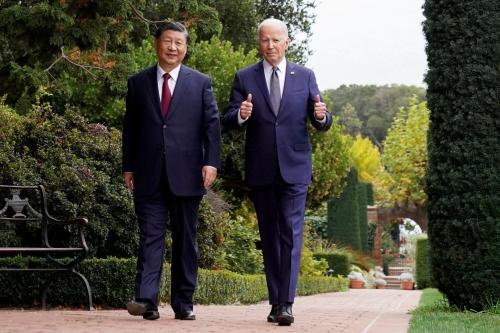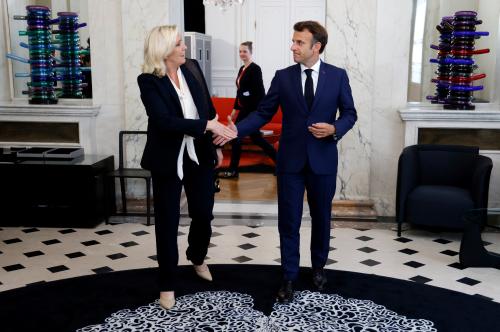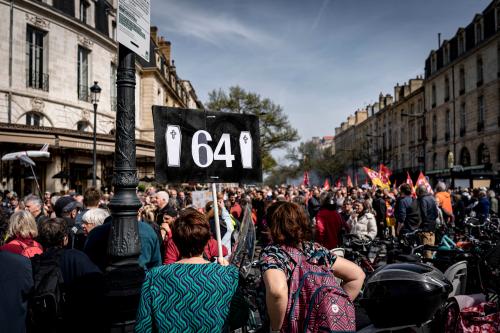French President Emmanuel Macron’s ambition to transform his country’s relationship with China isn’t new. Macron’s first visit to China dates to 2018, mere months after he was elected president. He then vowed to come back at least once a year to cement Franco-Chinese ties. The following year, he hosted Chinese President Xi Jinping in Paris, alongside Angela Merkel, then Germany’s chancellor, and Jean-Claude Juncker, then the president of the European Commission.
Xi’s 2019 visit came right after the European Commission published its new EU-China strategy, which formalized the triptych systemic rival-competitor-partner relationship, as it would come to be characterized. Even back then, Macron wanted to give Xi’s visit to France a European flavor. He reiterated the same willingness when he visited China in 2023 with Ursula von der Leyen, the current president of the European Commission. Of course, the COVID-19 pandemic had occurred in the meantime, precipitating Europe’s reckoning with its dependencies on China, and the subsequent weaponization of those dependencies by Beijing.
Macron’s visit to China last year made waves when he told reporters that Europe must resist pressure to become America’s vassal, giving the impression that Europe was caught between America and China. This modus operandi is characteristic of Macron, who is adept at pushing sensitive buttons and sometimes too eager to have difficult conversations. His trip last year happened not only after COVID-19, but also while Russia, a very close partner to China, was—and still is—waging war against Ukraine. Before his trip, Macron asserted that he wanted to convince Xi to get Putin to back down. That was to no avail.
Xi’s visit and Macron’s goals
This is Xi’s first trip to Europe in five years. Macron’s charm offensive during Xi’s visit to Paris (which is Xi’s first stop before Serbia and Hungary) is characteristic of the French leader in that it aims to achieve at least two separate goals. One is to convince Xi to end, or decrease, his support for Putin in Russia’s war against Ukraine, and notably not to provide Russia with key military materiel. The second is a corollary to the first: to form a closer personal relationship with Xi. To advance this goal, Macron took Xi and his wife, Peng Liyuan, to the southwest of France to visit the home of Macron’s late grandmother, whom he was very close to. Macron occasionally resorts to such shows of personal contact, like when he hosted Putin at the Fort of Brégançon in 2019. France and China are also celebrating the 60th anniversary of the establishment of their diplomatic relations.
Xi’s visit to Paris came at a time when the war in Ukraine has increasingly become a meat grinder, as Putin relentlessly attacks Ukraine’s infrastructure and civilian population. As Ukraine only recently revealed that it foiled a Russian plot to assassinate President Volodymyr Zelenskyy, time is of the essence.
Macron invited von der Leyen once again to the Xi meeting in Paris. They discussed international crises, particularly the war in Ukraine and the situation in the Middle East, as well as trade and people-to-people contacts. Other topics included common action on addressing global issues, such as climate change, protecting biodiversity, and alleviating poor countries’ financial burdens. The situation in the Middle East warranted a separate bilateral communiqué, in which both France and China called for a cease-fire in Gaza, among other issues.
Having von der Leyen at the table was key to sending a common European message, especially as she is known to be tougher on trade issues, having initiated the European Commission’s first economic security strategy last year—which was professedly country-agnostic but quite clearly directed at China. Notwithstanding Von der Leyen’s presence, German Chancellor Olaf Scholz’s absence was notable. Scholz visited China twice in the past two years and rebuffed Macron’s proposition to join him on these visits, similar to how he turned down Macron’s invitation to participate in the meeting with Xi and von der Leyen in Paris this week. Macron and Scholz did, however, meet on May 2 in Paris to prepare for Xi’s visit. These mixed messages seem to undermine impressions of European unity.
Deliverables and what comes next
For Xi, the visit has domestic importance, as he wants to demonstrate to the Chinese public that he is still fêted in Europe. Xi also sought to encourage Macron’s ambition for European strategic autonomy, an element that was already present in Macron’s visit to China last year. Xi’s interpretation of strategic autonomy is one where Europe turns away from the United States and moves toward other partners, particularly China. But this is not France’s or Europe’s interpretation. Europeans’ vision of strategic autonomy intends for Europe to build greater capacity and the ability to act, from a political, economic, and security and defense standpoint, to reinforce the trans-Atlantic link with Washington. By contrast, Xi’s goal is to drive a wedge between the United States and Europe and to show that there are limits to trans-Atlantic unity on China.
For Macron, the return on investment of his charm offensive might be even lower than expected, whether on trade or foreign policy. Macron doesn’t want to give up on convincing Xi to do less with Putin, but there is no indication that Xi will do so. The rest of Xi’s European tour suggests no inclination to such compromise, nor any larger willingness to curtail Russia’s action.
Indeed, Xi has now moved from France to Serbia, where he will mark the 25th anniversary of NATO’s bombing of the Chinese Embassy in Belgrade. From there, Xi will travel to Hungary, where Viktor Orbán will host him in pomp, and contribute to undermining European unity on China, particularly as Orbán seeks to entice Chinese electric vehicle manufacturing.
Maintaining European unity on China is key, but Macron and von der Leyen can’t do it alone. One may fear that what remains of Xi’s Europe trip will be the Chinese president’s capacity to divide and conquer.
The Brookings Institution is committed to quality, independence, and impact.
We are supported by a diverse array of funders. In line with our values and policies, each Brookings publication represents the sole views of its author(s).







Commentary
Xi’s visit exposes fault lines in European unity
May 8, 2024